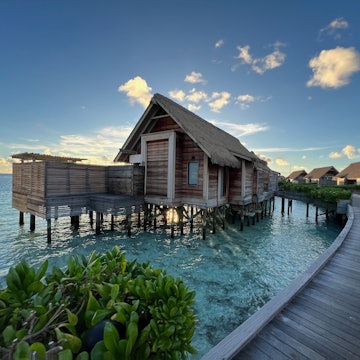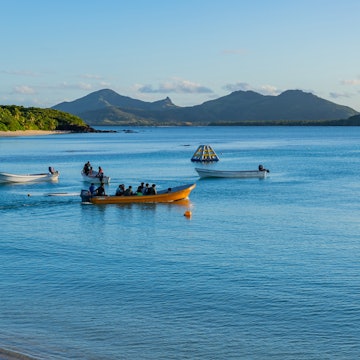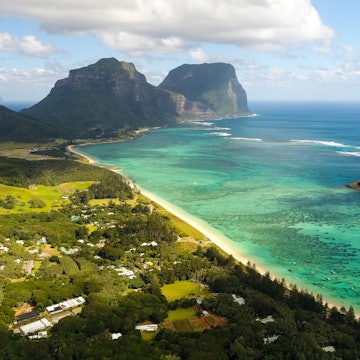
Fiji or Tahiti: which South Pacific paradise has the edge?



Hike through Bouma National Heritage Park in Fiji, or kayak to your overwater villa in Tahiti? © iStock; Stocksy
Crystal-clear lagoons, world-class diving, luxury resorts, spectacular jungle hikes…is there anything we don’t love about the South Pacific? If only we could spend our lives floating from island to island, comparing and contrasting the beaches, coral reefs and ultra-hospitable populations of each one.
Alas, we can’t. Even worse, when considering a journey to a part of the world where distances between islands are measured in the thousands of miles, some tough choices are in order.
Which is why we asked a pair of writers to cheerlead for the place each knows best: Fiji and Tahiti. Deciding which to pick for your next tropical adventure won’t be easy. But we never said it would be.
Flit around fabulous Fiji
Anirban Mahapatra is a travel writer and multimedia producer who currently lives in Fiji’s capital city, Suva. He is the author of the latest edition of Lonely Planet Fiji.
With due respect to every other island destination in the Pacific, I can confidently say there’s no better place than Fiji for an ideal family holiday in the dazzling ocean. While other island hot spots may tempt, there are several reasons why Fiji bests them all.

Take ease of travel. Given the remoteness of this oceanic region, Fiji is the easiest place to reach compared to any of its neighbors. We have direct flights to Singapore, Hong Kong, multiple Australian cities, Auckland, Tokyo, Los Angeles, San Francisco and Vancouver – and onward from there. (Tahiti has far fewer direct flights.) Convenient regional connections also make it possible to choose Fiji as a hub for trans-Pacific vacations. From here, one could jump off easily – on a nonstop flight, no less – to other destinations including Samoa, Vanuatu, Tonga, Nauru, Kiribati, New Caledonia and even Hawaii.

Fiji’s surfing credentials
Some of the world’s most sought-after breaks draw surfers from around the planet to Fiji. Divers and snorkelers can explore coral wonderlands (called the “soft coral capital of the world,” Fiji has nearly 400 coral species), lock eyes with fearsome bull sharks in shark-rich dive sites, or swim with giant manta rays in shallow ocean passages. A smattering of marinas located in natural harbors across the country are popular stopovers for yachters navigating their way across the Pacific. Given the sheer number of aquatic adventures, and the fact that they are suited to people of all ages and skills, Fiji’s advantage over its neighbors is unbridgeable – and by a long shot. Tahiti can make a case around its heavenly beaches and luxurious resorts – but we’ve got plenty of those here , too.

On dry land, the volcanic highlands of Fiji’s interiors have incredible trails that are a delight for hikers. Where else does one get to traverse mountain ridges draped with golden savanna, ford gurgling rivers flowing through pristine rainforests, tread along desolate beaches leading to hidden waterfalls or summit sublimely beautiful plugs of extinct volcanic craters – all on one trip?
There are plenty of cultural experiences scattered along the way, too, which offer up-close insights into one of the oldest and most cosmopolitan cultures in the Pacific region. Whether it’s spirited kava ceremonies with generous hosts, intriguing storytelling sessions in villages with long histories, a delicious traditional lovo (pit-roast) lunch on Sunday or a vigorous game of rugby with youngsters pretty much anywhere and almost any day of the week, there’s always an opportunity to mingle with Fiji’s unhurried population – and share a few laughs along the way.
Is it surprising that Fiji tops all its regional neighbors as a repeat destination for global travelers, who couldn’t possibly sample all of its offerings on just one trip? Can any of Fiji’s neighbors stake an equal claim to the best destination in the Pacific?
I didn’t think so.

Tiptoe through tempting Tahiti
Lonely Planet’s French Polynesia expert for nearly two decades and an island resident for nearly three, Celeste Brash is forever learning about and delighting in her adopted home. When not traveling for writing work, she can be found on her family’s pearl farm or taking Tahitian dance classes.
Put simply, the islands of Tahiti (part of French Polynesia) are the most beautiful and varied ones in the Pacific, if not the whole planet. I wish I had visited other island nations before moving to this country in the 1990s – because Tahiti has now spoiled everywhere else for me. This includes Fiji, a place that I know well and adore. But it simply doesn’t come out on top.
With 118 islands over five archipelagos, no other island destination offers as much variety. The government’s tourism department has forthcoming plans to cap tourism at 280,000 visitors per year (in contrast, Fiji draws some 770,000), which means that an oceanic zone the size Western Europe will never get overrun. Only a handful of islands have a well-developed tourist infrastructure; many others, including Fatu Hiva and Raivavae, only offer small family pensions, where you can have the cultural experience of a lifetime.
If it’s glamour you’re after, nowhere in the Pacific rivals the luscious overwater-bungalow resorts on Bora Bora’s otherworldly blue lagoon. Those on merely mortal budgets will find similar beauty on the crowd-pleasing, superbly mountainous yet beach- and lagoon-blessed Mo‘orea. In between, islands like Huahine, Tikehau and Hiva Oa have many lodging and eating choices as well as tons of activities, only with a small flow of visitors. There really is an island for everyone here.

But looks aren’t everything. Right off the airplane, you’ll be welcomed to Tahiti by a ukulele orchestra and given a gardenia to tuck behind your ear. Outrigger canoes glide off white or black sand beaches into limpid, swimming-pool-like lagoons. Country-wide, you’ll hear the deep rhythms of toere (wooden drums) emanating from community centers, where local Tahitian dance troupes practice this vibrant, ever-evolving art. Everywhere you go, smiles are returned by bigger smiles, tattoos grace proud limbs and luminous Tahitian pearls glow on ears and necks. The whole country is tidy, clean and graced with a floral fragrance.
Taste traditional Polynesian food
Tahiti’s unique tropics-meets-French-and-Chinese cuisine is considered among the best food in the South Pacific – and a resurgence in local ingredients and new twists on traditional Polynesian dishes is now bringing the food scene to new heights. Dine on creative gastronomy at fine restaurants, or seek out something delicious at a lagoon-side food truck. Fresh baguettes and Bordeaux wines are found alongside fire-charred breadfruit and the sweetest pineapple juice in the universe. You’ll never have a bad meal.

When you’re on the beach, you can drink mai tais or get active. Water sports include fauna-heavy diving in air-like visibility (Fiji’s waters are murkier), surfing, snorkeling, paddle boarding, traditional outrigger sailing and whale watching. On land, cool activities abound, including hiking waterfall valleys and exploring the most impressive archaeology in the region (many consider Unesco-listed Taputapuatea on Raiataea the spiritual center of Polynesia), plus more-adventurous pursuits like skydiving and canyoning (rappelling down waterfalls).
Now also happens to be the best time ever to fly to Tahiti, with relatively new and affordable services via San Francisco with United Airlines and low-cost-carrier French Bee, with onward connections to Paris and countless other destinations. Other places served from Tahiti include New Zealand, Hawaii and Tokyo. Inter-island flights are going down in price thanks to Air Moana, which started services in early 2023.
For anyone in North America or Oceania, Tahiti is closer than you probably think. And it’s worth every minute of travel time.













